Kate Bowler: Do you know the feeling of setting a big goal? I mean, a great big goal. A promotion, a creative project that you have clarity for, a new degree, a debt you’re trying to pay off, maybe a fitness goal, or a vacation you’ve been dreaming about forever. Or maybe legacy work writing that book, making it to that birthday, celebrating that milestone. There is something about that kind of horizon setting that can propel us forward. The rush, the problem, solving, the orienting ourselves towards something in the future because it feels so good to try. But what about when something knocks us off that path? Our bodies break down or our dependents need us, or grief or depression or illness overshadows everything else? I’m Kate Bowler, and this is Everything Happens. Today, I’m talking to someone who is a great big goal setter. No, really. She decided she wanted to be an Olympian, and she did. Alexi Pappas is also a writer and filmmaker. She is the author of Bravey, Chasing Dreams, Befriending Pain and Other Big Ideas. She lost her mom to suicide when she was only four years old, a tragedy that colored her own experience of her mental health and her ambitions. Alexi took up running not casually like as in I went on a run which was mostly a brisk walk around the block, but professionally, her determination allowed her to run the 10k in the 2016 Olympics, a goal she had finally realized. And it made her wonder what happens now and what she discovered about how to lean into pain is going to crack us wide open. Alexi, I am so grateful you’re here with me today.
Alexi Pappas: I am so happy to be here, be here with you.
Kate: I’m at the end of one of those days where, like all I want is a friend, so this feels perfect for me. Yeah. I wondered if maybe, even though it’s the it’s may be the hardest part, I wondered if we could start at the beginning if that’s alright with young Alexi? If I were going to meet you when you were little, it seems like you have this kind of wild and unstructured and free and also painful childhood. And it sounds like there wasn’t always a lot of room for you to be a kid in your home during that time.
Alexi: You know, when I was younger, my mom was like, quite sick. She was manic bipolar. She was in and out of all these hospital settings and rehab and like just a lot of really catastrophic moments. And my dad was managing that, keeping it all a secret because that was kind of the way in the 90s with mental health. And then my brother and I were just like kind of growing up and figuring out how to be independent, I think during that time, what I realized recently, which- which is not directly related to the book, but I think that I had my most exuberant a boolean, I don’t know out there moments alone. And that has made it really interesting for me to start to be that more expressive self in the public because I think I just thought as a kid that like those were for yourself. And I needed to do that alone. So that’s been a thing I’ve been thinking about a lot lately where I’m like, can the world handle it? Is it OK? Is there room for two of us? Because my mom was so out there and not in the good way that I’m like, Is it OK if I’m like a little bit theatrical or eccentric? Is that okay?
Kate: And people don’t know what they’re going to make of us because we haven’t always become it yet. And maybe as we do, there’s a little more. Yeah, that makes a lot of sense to me. When I was little, I was very overly socially attuned. And so just like too sensitive, you know, in my mind’s eye, too aware and the kind of childhood you’re describing in which you were kind of self-made and in a way that, like a little kid might not know what to do with, like you had your own, you made your own bedtime. The center of the world that you lived in was, was your mom. And it sounds like that was a lot of freedom, but a lot of a lot of chaos and maybe a lot of loneliness, too.
Alexi: I think that thing holding me back was just not wanting to hurt my dad. Like knowing that I was never going to do something that made him that really hurt him. And that was because of, you know, I think, a gratitude for what he was doing to raise us and a sadness for what he had been through. So that was a tether. It wasn’t like I was trying to act out in a way that would hurt him, but you could still go pretty far and not hurt that man.
Kate: It sounds like he was, you describe helicopter parents that have this like constant attunement like the micro movements of their kids. And your dad was like, Are you? Are you fed? Will you come home later? Shrug. I’ll see you tomorrow.
Alexi: Exactly. And that is something that I’m very grateful for because I do think it must be really hard to be a parent if you have the time and space to give your child more attention than that because he simply didn’t have a choice. But I imagine if you do have the time and space being able to figure out how to guide without to you know, I believe that parenting must be very challenging. So I respect that craft.
Kate: Made me think, though, that it sounded like he was. Tell me if this is wrong. It was almost like he was a foundation, but not always like walls and a ceiling, like he was always there, but like and loving and wanted you to try. But wasn’t always going to be the thing that, like told you that you had to get A’s instead of Bs or.
Alexi: For sure. He was definitely, like, just wanted to make sure that I was doing activities that would show me resilience in ways where we didn’t have to talk about resilience. He wanted me to do certain objectively good things like I think it was important to him that I was like in school and things like that.
Kate: Yeah.
Alexi: But certainly the pressure and the desire for performance came from me. And maybe not always from like the healthiest place because I had such a not clear understanding of like why my mom left at that age. And so I wanted a life that felt like I was moving in the opposite direction of her, which what I was told about her was that she just was so sick that she had to go. And if you’re told that, then the greatest fear, of course, of all, is that if you ever feel that way, you will have to go. And so that was what I thought. And so I was like, Well, I better not feel that way. And what I- what she felt in my childhood understanding was like a failure or sad, you know, those sorts of feelings. And so I wanted to be happy. I wanted to be successful. I wanted to matter and all these things. So it was quite fueling, but it was also really unsustainable. Yeah. And a lot of high achievers, I’m finding, like, have something they’re pushing up against, so like it is potent.
Kate: Totally. It is activating. It is, like there’s I don’t know, I forget who where I heard it, but it was, you know, the feeling that certain kites need a lot of wind and that it does- it does wake you up to the world in a certain way. But it can also be just so intense that it’s, I don’t know this for me is hard to do anything but achieve when I didn’t give myself an alternative.
Alexi: Yeah, I was going to ask what kind of kite you are?
Kate: A really performative, cheerful one.
Kate: I read recently about the distinction between stress and trauma, which I found sort of illuminating about, I’m somebody who moves toward pain and intensity and hard things really naturally, but it did make me realize that there was a bit of a blurry line in my life between stress and trauma, because sometimes the harder it my life gets than the harder I work in all areas of my life, and I wondered if they those categories weren’t like a little bit too close in my life.
Alexi: Well, what did they what did your research say about it?
Kate: Well, it said that stress is good for the most part and that it can make us, it can sort of be like the spur in our side and help us back up and make choices. But that trauma is closely tied with an inability to choose. It’s like it’s the big things that happen to us in which we felt powerless, like, I’m, you know, in my situation as an adult with a terrible illness. And it sounds like in your situation as a kid losing your mom. But that the that those are the things we can’t choose. And so therefore, it’s like hard to think about like we became certain people, but none of that sort of comes out of that framework of choice where you’re like, well, like, who else was I going to be? I was already forced into this category.
Alexi: Yes. OK, so that’s interesting to me because so I know kind of get like guidance and coaching from like a former doctor of mine where it’s kind of like we’ve moved into this like performance world. And something that he talked to me recently about was related to what you were saying, he believes that the self is something that we create and choose, rather than something we discover. And I was like, what? Because I feel like again, the narrative I was fed growing up was like, discover yourself as if its in there
Kate: Yeah it’s in there. Find it.
Alexi: And that is kind of cool to think about, like, yeah, it’s in there I just have to find it. But it’s also kind of sad because it makes you feel that it might be fixed in some way or it comes from, you know, your parents or it comes from something that you can’t control. And I liked his perspective on it because I think, like you said, it’s a little bit more empowering. It’s like, No, no, no, we are our self is like the choices and the the patchwork quilt that we make. So I liked that about it, and I think that relates to what you were saying about trauma versus stress.
Kate: So part of my research as a historian is into these sort of myths we have about self making, like how much of our own selves are, you know, the result of our choices and our bootstraps and our incredible attitudes. And you know, so I’m Canadian, and I like to throw that in there immediately just like 100 percent of all Canadians do. But there’s a especially prevalent American story, which is that you’re a true American if you are if you’re self-made and they always describe these like titans of industry giants who walk among us. I think to what we’re talking about has such a lovely distinction, which is that there is like big T trauma and there’s the places we’re born and the people were born to and all the things we don’t choose. And then there is this huge place of I love what you’re describing of like self making and not just discovery, like it’s yeah, and it seems like one of the most powerful things you learned was the secret to trying. Like you learned how to really, really try and you applied that gift to running. Tell me about when you like, I’m just making laser hands right now.
Alexi: So OK. As a child, I think trying was like the only answer, and it was the only option my dad gave me. Like, he was really understanding, but he was pretty stubborn about like, just try. Like any time I was complaining about anything, couldn’t sleep, didn’t, wasn’t running well, failed a test. It was always like, OK, just try. And it was like there was no option of like, let’s pivot, let’s quit. It was like, nope, you’re just going to keep trying. And so it was ingrained in me that that was the right move for any challenge. And I and I trusted my dad because he really didn’t say much. But when he did, I really heard it and he would say that a lot. And so I was, you know, I was a trier and it got me very far. But I do think that the good news and the bad news about trying and not giving up is that it works like you will get somewhere. It’s just painful along the way, like because you might be humiliatingly bad or whatever you’re trying for a long time, but it will- you will get somewhere. I think a lot of my trying as a child was like the real important thing to me was, did I get the result? And I really wanted the results, I really wanted to have the tangible objective results because that would prove to me and everybody else that I was doing OK and that I was thriving and that I wasn’t going to die or whatever it was that I was like, deeply afraid of. But today I actually had, I had an epiphany the other day when I was walking my dog, which was the great joy in life to me now is admitting that I want to try for something or that I want something and then trying my best for it and knowing that the outcome I like, I just can’t control it like I cannot control a lot of times it’s tied to other people which you can’t control, or it’s just tied to anything. But there’s so much joy in actually being 100 percent honest with yourself or with people about what you want, even if it’s like an embarrassing want or it’s like a moonshot want. And then truly trying for it is like, that is a joyful life.
Kate: Yeah. Something like a great thing, like a coach said to you, something like just offhandedly like, oh, very, very few people actually ever really want to be great or something like that.
Alexi: They very few people actually try to be great. It’s like people want it, but they don’t. I think his distinction was between being interested in a goal and being committed to it. And it’s true that it is much easier to find reasons why your dream is not possible rather than possible. Like, I’ve totally shifted to being like, what joy in being a person who like really threw your like spaghetti self against the refrigerator or like that is life.
Kate: The joyful uncertainty that you’re describing, where not knowing can feel OK, like where the possibility of failing could be OK, where trying could be a bigger feeling than shame or fear or, you know, just naps. I love naps too. But like, you know, one of the things we’re always trying to talk about with our community here at the Everything Happens project is like, there’s all this stuff we can’t change and then there’s there really needs to be lots of permission there for people to accept tragedy without feeling like failures, to understand their own brokenness, to be able to like just be honest. For a hot minute about what that’s like, then there’s this other part of the spectrum that I just like feel so thrilled as you’re describing, which is just like agency it’s trying its and also we need to dream and also we we need to make a future for ourselves, even if our future is uncertain and scary and very often, like limited. I like that you’re so passionate about throwing ourselves into the future.
Alexi: Oh yeah. And something that I heard you say early on is, is the idea that vocabulary really matters to you or just like how we talk about things. And that’s probably where it all starts, right? Is like being able to see a dream or whatever you want and take it seriously or like to call it a want instead of just having it live inside your head and never surface. And I do think vocabulary shifts are like hugely life changing, even if the situation is the same.
Kate: Because I am, I give these history lectures sometimes about like the limits of mindset. It always starts like this. It’s like in the late 19th century, psychologists and culture became obsessed with the power of the mind, you know, and I get, like, very concerned that we’re, like, too obsessed with mindset. But one of the things I thought was just so incredible about reading about your the way you try, the way that you have performed as a long distance runner, is that shifting your words and categories around what you’re expecting in a run completely changes the way that you frame out what your what your goals are.
Alexi: Yeah. Well, when it comes to pain, first of all, I think the first thing was accepting that like pain will be a part of my sport, no matter what. Like, no matter how good I get, running hurts. But there’s a good pain and bad pain. So like associating the pain is something that like is a part of it and is not an offensive thing that helps in other, you know, when I when I had like the post-Olympic depression, it was also important to accept that I was going to be sad or have pain for a while. But it was like once we expect it, then it becomes less offensive. So I think I just tried to have a different relationship with pain, first of all, and then to begin to visualize moments when I was going to experience pain, whether it’s like there’s going to be a hill in this race, that’s pretty obvious, it’s going to hurt. And then seeing yourself like, go go through that process before you do it allows you to literally feel more capable and you are. So that’s just like a very practical athletic thing.
Kate: Yeah, that may be like the difference between like setting records versus finishing versus that, like, you just decide that if pain is something you have to live beside that you would expect different things from yourself, but that they would all like have a purpose.
Alexi: Yeah. Yeah, and knowing that if it’s good pain meaning, like if you’re not injured, if you’re not, you know, heartbroken or whatever bad pain might be to to you, then it’s OK to like, lean in and ride that edge and really have a joy watching yourself in that place. Pain still hurts. It still hurts, but it’s like it hurts in the like, Whoa, this hurts. Like, Oh no, this hurts. Yeah. I felt that on my workout this morning. You know it was. It was a workout and it hurt. And and I just decided to, like, stay in it and see how long I could do that, you know?
Kate: Yeah, I don’t. I don’t think I had ever read someone speak as frankly about like what you’re describing is like riding the limits of pain. And I loved it because I experienced pain all the time with stuff like, I’ve got chronic pain. I’ve had a lot of surgeries and so I know what bad pain feels like. Yeah, I also. I know what endurance feels like too. Yeah, and it’s very different because historians, our superpower is sitting on our butt for unbelievably long periods of time and staying like crazy, mentally focused as we like tear through archives or something.
Alexi: Wait tell me more about that, tell me more like why you love that? And like what it is? I just want to learn. I want to hear your or your latest thoughts on being a historian.
Kate: For history, like for the history books I write, I usually can feel like the edges of an argument. And then I have to go on a run until I get there. But when it’s something like memoir, which we’ve both done, I don’t know how you felt about it, but I feel like there’s always like a glimmer of something that that hurts, but it’s good. And then I have to like, write my way into it until I said the the hardest truest thing. And then I feel kind of like a sense of release like, oh, and there it is, and it’s because it’s like out of me.
Alexi: Yeah, yeah. It is really difficult to put experiences into words. And that was something that I found was I had never tried to like, describe any of these things. And that was a great joy and a great challenge because of words, you know, everybody has their own. I don’t know, you can’t promise. You don’t know how it’s going to translate, but you just do your very best. And I think with memoir, it’s different than not a journal, right? Like you are writing it with an audience in mind. And so you are trying very hard to connect, and that’s hard. But it’s also like, really, really cool when you find those sentences where you’re like, I think I did it.
Kate: Yeah, I built that bridge. It’s not just about me, it’s about us.
Alexi: Like that’s the other thing is when I read now, I’m like, this is this person when they wrote this book, I hope some of this stuff is universal, but I also recognize that that person is continues to grow and be a person after this book.
Kate: Yeah, that’s right. Yeah, I don’t think I realized that either. I thought everyone was just kind of like Buddha style, extrapolating deep truths from the universe, and they would live for all time. And yeah, and then I turned 40 and I was like, Oh yeah, right, we change. And we’re also dumb at different times that makes.
Alexi: And isn’t that isn’t that a reason to do what we feel compelled to do when we feel compelled to do it? I think that’s like really the so what moment is like so so if you feel compelled to like do X, Y and Z project or chase X Y or Z dream to not assume that like you’ll have this drive for this specific thing forever and it is totally worthy to chase that now. I think that’s that’s really the that’s really the thing of this is like if people are feeling like they’re feeling something, then like, I think that now is the time to like, try.
Kate : You have that crossroads kind of early on when you were talking to a professor, you were like look, I love words like this or I could be a runner, and she- she told you to choose your body. I wonder you’ve done really amazing things. I mean, you ran the 10K in the 2016 Summer Olympics for Greece, which is just the most amazing sentence to put together. You set a national record. I don’t mean for this to sound like a simplistic question, but like, what did it feel like to accomplish something that you dreamed about for that long? Like what an incubation period, you know for for a single dream?
Alexi: Yeah, I think the best thing was that I had a coach. I felt very lucky who prepared me physically and mentally to enjoy and make the most of that moment. And that is very difficult because training and athletics are very much about at least in running, you are like a pencil that you sharpen and you don’t you can’t sharpen it too much all the time because it would break. You want to be like a dull, strong pencil for the most part, but at those peaks, you want to be like the pointy pencil you can be, which means like your mind and your body are on the same page and they are as progressed as they could be. And I was that like and I knew that and I think knowing that and feeling that allowed me to be at the Olympics in a way that felt like a celebration and not a test. Mm-Hmm.
Kate: Surrealness is the right word used. Yeah, it’s just a beautiful, surrealness of like that sometimes, and people get it I remember the feeling when I was like running down the aisle on my wedding day and there was just a moment where we like busted through the doors and it felt just slow and sweet. And I thought, Yeah, I’ll never, I’ll never forget that. And I there’s some just gorgeous moments like that where you get to keep it for later. After the race was over and the closing ceremony, and then everyone goes home and it sounded like it was the most amazing sort of intense summer camp experience, seeing all the gorgeous internationalism and multiculturalism and euphoria of all these elite athletes. You had a very intense ending to all those feelings, you describe that post-Olympic depression. What was that cliff like for you?
Alexi : Now it’s not a secret. At that time, I guess it was like it was pretty much a secret because otherwise I would have known about it, but now understand that all Olympians, whether they win gold because I know someone who won gold and or get last, which I know someone who got second to last in her race, they feel this kind of loss afterwards, this post-Olympic depression, which is really, really normal. You know, it’s now, I think, common that there’s a trimester after you give birth that has a kind of dip and it’s just an adrenal, it’s a fatigue. You know, it’s just the what comes after you chase a big dream, whatever that is. And I felt it and I rejected it because I again associated that with my mother and I didn’t want to feel anything that felt like what she must have felt because I didn’t understand if there would be a way out for me. And so I just really, really rejected it, and I wanted to know what the next goal was, and I wanted to know yesterday and I wanted to be chasing it. And so rather than like, pause and let the years of like 100 mile weeks, you know, just like chill like not just physically but mentally and not know what’s next. I was trying to put together a life without having any kind of recovery. And that made me spiral in a really negative way because I was, you know, in red lining. So I think it was like pretty physiological, like it wasn’t like I was just stressed. It was like I was stressed and that led to not sleeping, which leads your brain to have changes over time. And, and I basically launched into like this full blown depression, which is called mine was a situational depression. So it’s like, you’re OK, you’re OK. And some things happened to you, and it feels like you’ve fallen to like a well or, you know, off a cliff. And again, I didn’t want to accept that. And so I just kept going until my dad, like, made me get help. And that was like months afterwards, and it really didn’t have to get that bad. It’s just I had no other vocabulary to see myself, as what I now understand is like, I had an injury to my brain and I just could not. I didn’t see it that way. But the vocabulary shift has helped me a lot since.
Kate: And I hear that from a lot of people who in our part of our communities they’re just they’re, they’re either in the momentum of something hard where they’re managing an illness or they’re getting a divorce or they’re, you know, managing a business or something that’s that struggling or they’re in a profession that just especially in the pandemic, or in the post-pandemic months just won’t let up. And then with all the momentum they just can’t ever like, regulate, can’t ever catch their breath, and then it’s and it’s just so hard to take inventory when you kind of forget that you’re you’ve just kind of been hemorrhaging along the way.
Alexi: Yes, there’s not like a practice built in respecting the moment after. So we feel like it’s a choice that we’re making or like. It’s like a weakness, you know?
Kate: Yes, there’s such an interesting tension, especially when we talk about mental illness in that relationship to effort like. One way of describing depression is the inability to try like that deep abyss that convinces you that everything is useless anyway. When you described your recovery in using cognitive behavioral therapy, which has like a really, I always thought very sensible theory about trying, like very simply put, that you can kind of pattern yourself into actions that are good for you and then create good feelings that we all need. And I imagine that was like a strange thing to reconcile yourself to that you’re if you’re instead of just being like an all willpower framework, just letting yourself also have had moments where you just kind of like got swept under.
Alexi: Well, I mean, one day my my doctor, he told me that actions change first, then thoughts, then feelings in that order only. And that was a real life changer for me because I felt so awful. But he was like, fine, you’re going to feel awful for a long time. It’s like, it’s like you have a broken bone and it’s going to feel broken and painful for a long time. But that doesn’t mean it’s not healing you if you do the actions. And so what I was able to do was just completely focus on my actions, regardless of how I felt. And it’s not unlike accepting the pain of a race where you’re like, This will hurt, I will keep going. And I became, you know, I suppose, a little robotic about it because I didn’t feel great. I didn’t feel like myself. But the only option I had was to try these actions and trust him as a guide, as a coach and see what happened. And just because I was so convinced that I would never feel like I couldn’t feel worse than I was, like, well, I guess I’ll live another day and see if it helps. You know, it was like this hilariously, yeah, like I just submitted to it and it did work. It took months, and it was so unclear to me where it was all leading. But maybe that’s the athlete in me where, like, I didn’t really necessarily trust that this was going to work, but I was committed to it. So and I think you can commit without trust. So if you were a skeptic like me, you can still do the actions and then the trust is built over time and now I trust. But I can’t say at that time that I was like believed that I would be better, but I did commit and I did try.
Kate: I have a lot of depression in my family, and I think what you’re describing is kind of just where we landed to where if if there’s like a depressive episode or or like chronic depression, be like, OK, well, if that’s the reality that I’m living inside right now, then I need to set up some guardrails. I get up at 7:30, I go to bed at this time, like they like make patterns and I can always hear it with my dad actually, who always speaks very openly, I think very bravely about his depression, but I can tell when he wakes up in the morning because he has this little song, he sings. He goes like: “go Jerry, go Jerry, go Jerry, Jerry, go!”
Alexi: Wait really?
Kate: Yeah, he’s just like willing himself, I think he does it because he’s overwhelmed by the day, and I I always think it takes, I think it takes great courage to be depressed.
Alexi: Oh my gosh yeah and if you can have a little bit of a sense of humor about it, it helps, but that’s hard too to have like, OK, there’s going to be I feel shitty every day, but I know that I’m on a path or like, I know that I’m committed for a period of time to whatever it is that I’m doing.
Kate: Yeah. I can’t control the feelings, but I can control whether I get out of bed right now, whether I turn on the lights right now. I always thought it was like one of the limits to the like be present live in the moment, people. So I was like guys like, you know when it doesn’t feel fun to live in the present when you’re in a lot of pain, when you dying. When you like, you know, you really just want someone to come by with the Tranq Dart. And just like-
Alexi: Well, that’s when that’s when you do it for your later self, right? You’re like, I’m going to do this now, and I hope that my later self like, thanks me.
Kate: Yeah. Sounds like it led to a lot of self-compassion, compassion for your family. I mean, you really dug deep to say, like, even though I’m really scared, even though I’m scared about everything to do with my mom, that I’m just going to be the person that like learns to be a little more loving toward myself here, even though this place is really terrifying.
Alexi: Yes, and that’s where I think your work as a historian is probably quite empowering because knowledge brings a lot of compassion, like understanding that the kind of care that my mom got would not have helped me made her more human to me because I was like, Oh, she just like didn’t get great help. That knowledge, that’s where compassion comes from, right? And you can retroactively heal yourself, you know, once you understand things and yeah, but it takes like a determination maybe to to rewrite that whatever it was and understanding you had, that doesn’t feel useful anymore.
Kate: I think what rewriting stories helps us believe is that we can change, and even if we can’t, there can be more space. I think you’re calling us to is that is that to be here with things as they are with the things that are painful and also, you know, beautiful that you’re so excited to race into a future toward that that all of it requires that we have a lot of courage and that our dreams and also our pain requires us to be brave. Like I think that’s one of the things I find so inspiring about you is that your hardest days and also your most incredible days, like both of them, required real courage. And that if we want to be people that live into the future that we, we need to do it in a way that’s that’s wide awake. Thanks so much for doing this with me.
Alexi: Oh, I’m so grateful and thank you for having this community here because I never realized how different a vocabulary in a conversation could be as someone who, just like, simply understands what it is to feel some of those feelings. It just like you have a base, it’s like you went to the same university or something where it’s like, Oh no, we don’t, we don’t need like and also, I’m OK. You know, like, I like talking to someone where they’re not looking at you, like, you’re not OK. It’s like, No, no, I’m OK.
Kate: This is what, OK it. It’s just it’s both things at the same time.
Kate Bowler: If you’re feeling particularly low today or if basement level is just your normal resting place, let’s borrow a little song from my dad, shall we? Go Jerry, Go Jerry, Go Jerry, Go! Or Go Alexi, Go Jenny, Go Sarah, Go! I’m going to put your name in right there. Go you. Some days it is a really big win to just turn on the lights or get out of bed or shower, or feed yourself. To call a friend or get fresh air. Or finally, try that thing your therapist has been trying to get you to do. There’s so much to learn from an athlete like Alexi. About recognizing the distinction between pain and an injury, about how to ride out the pain for as long as our bodies and our minds might allow about self-discipline and goal setting. The joy of trying for something, perhaps trying by reaching out to a therapist or pastor or doctor for help or telling a friend you’re struggling or picking up a new discipline, not trusting where it will lead, but committing yourself to the process nonetheless. Maybe the Olympic run isn’t in your future, but perhaps we can start with those tiny steps toward the light. Together. So here’s a blessing for all of us who struggle in the weight of darkness where the thought of even beginning to begin is just too much. Blessed are we who discover that there is language for the injury that has befallen us, that there are words to define it, like stepping stones that can stabilize comfort and lead us forward, even if we don’t exactly know where they will lead. Blessed are we agreeing to a process where actions build the thoughts that build emotions and not the reverse. When it works, we’ll know it. And oh, how blessed are we when we don’t have to pretend anymore or go it alone for we are all part of the beauty and the struggle together.
Kate Bowler: And P.S. It is a really hard time to be a person in the world. So if you are someone you love is struggling, there are ways to get help. Call the National Suicide Prevention Lifeline at 1- 800 273 8255 or text Hello to the Crisis Hotline at 741741. Just remember you are not alone. This feeling will not last forever. You are loved. You are loved. You are loved. You will not disappear. You are here.
Kate Bowler: Our work on the Everything Happens podcast and with the Everything Happens initiative is made possible because of our partners and generous donors Lilly Endowment, the Duke Endowment, Duke Divinity School and Faith and Leadership. An online learning resource and a huge thank you to my team who makes this work not only possible, but fun. Jessica Richie, Harriet Putman, Keith Weston, Gwen Hegginbotham, Katie Mangum, AJ Walton, Katherine Smith, Mary Jo Clancy, JJ Dickinson and Jeb and Sammi. And if you’d like to be a human with me, come find me online at KateCBowler. I also have a weekly email that might be the right dose of love and courage you need, sign up at KateBowler.com/newsletter. This is everything happens with me, Kate Bowler.


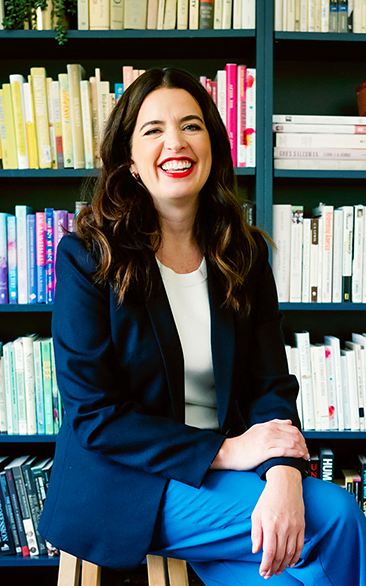








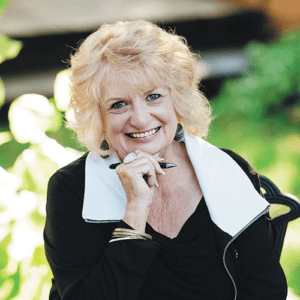
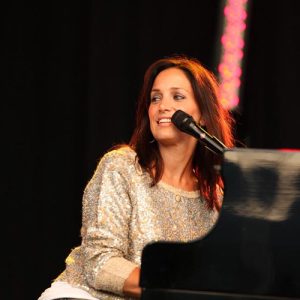
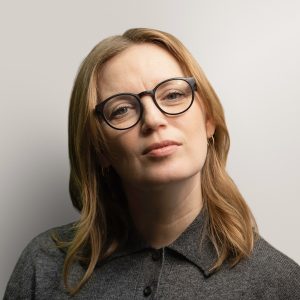
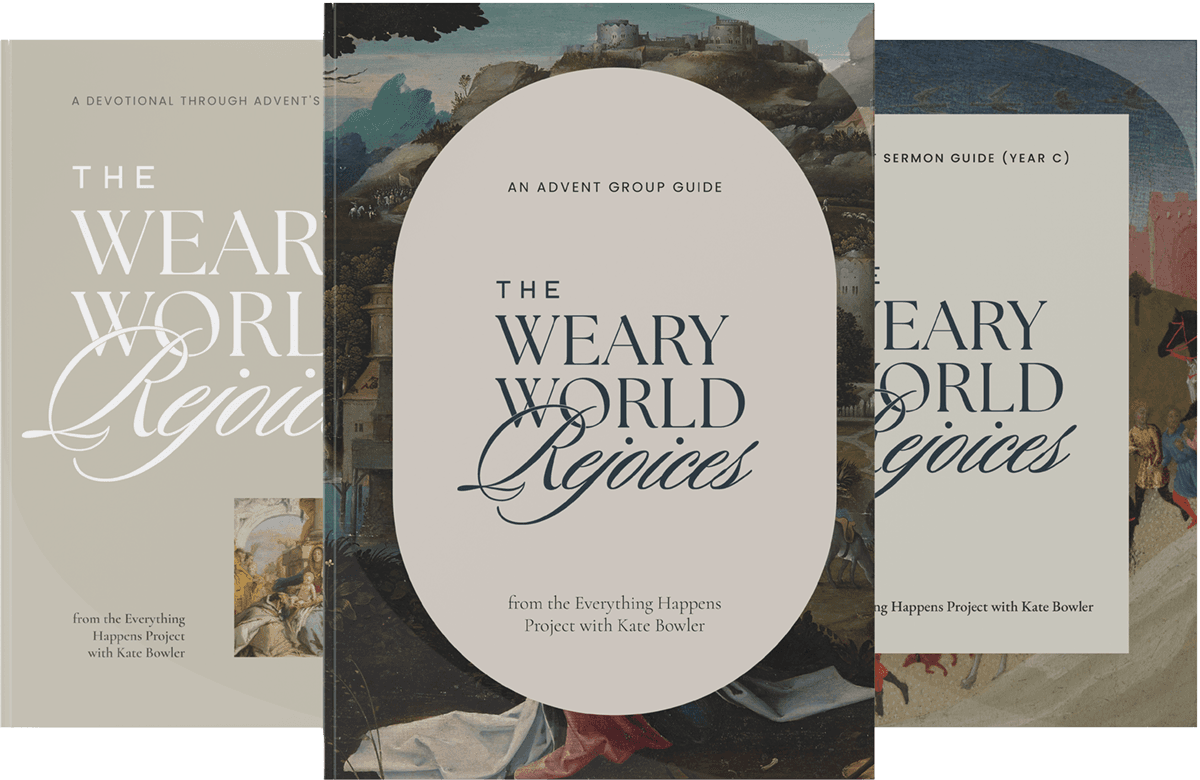
Leave a Reply